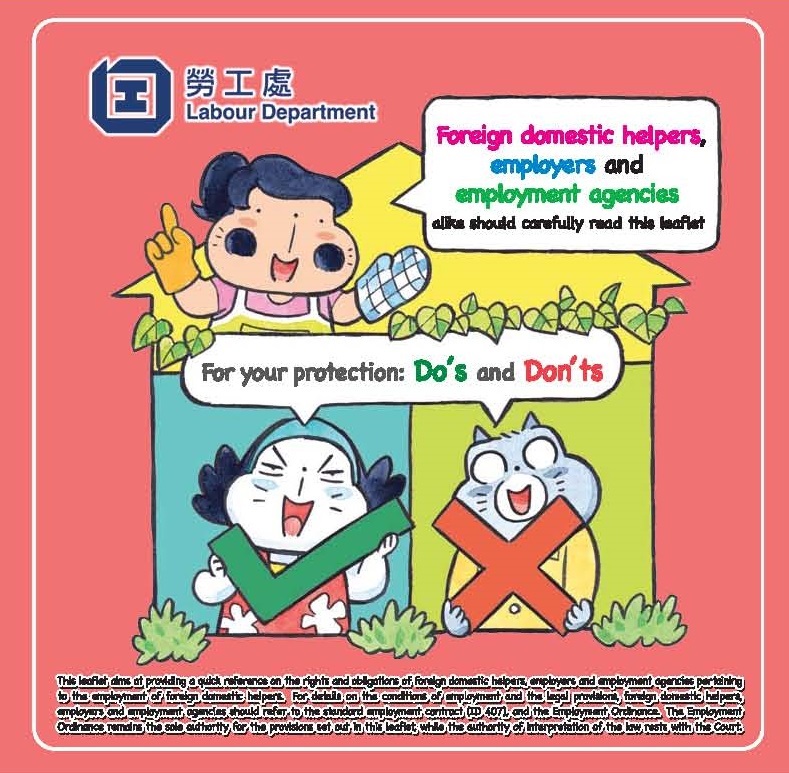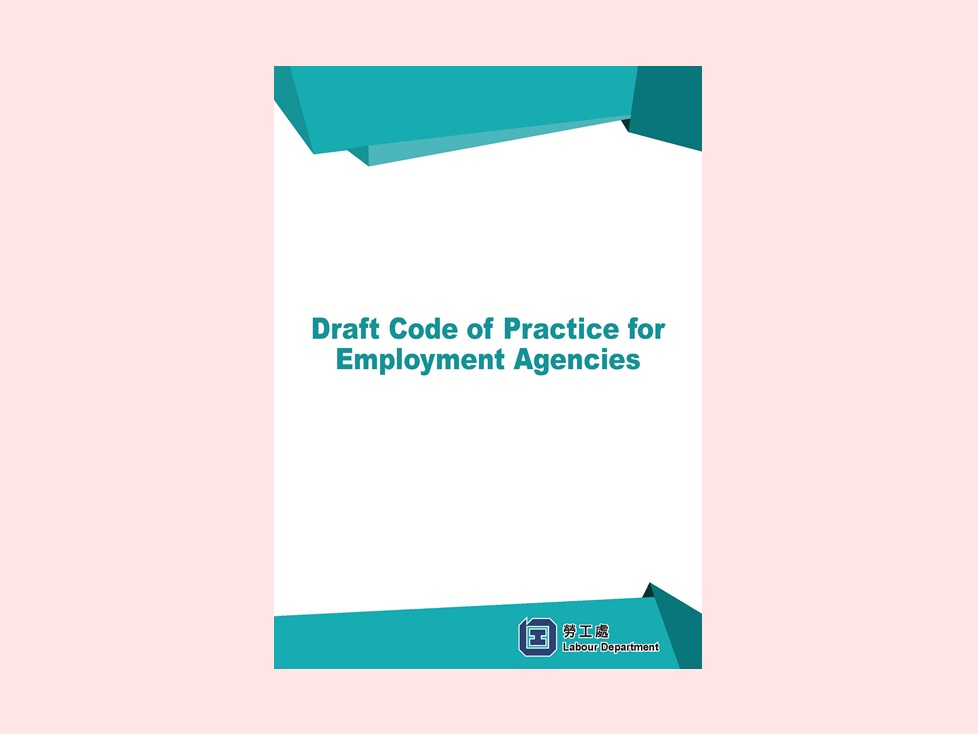All-out efforts to enhance protection of the rights of foreign domestic helpers and their employers
24 April 2016
A young colleague in my office has just become a father and we are sending him our warmest congratulations. Like many other young working couples, the new parents need someone to help taking care of their baby and thus become an employer of foreign domestic helper (FDH).
Currently, nearly 270 000 families in Hong Kong are engaging the service of FDHs. There is no doubt about the valuable contribution of FDHs to local families and towards Hong Kong’s economic development. With such a large group of stakeholders, promoting harmonious employer/employee relationship and tightening up the regulation of employment agencies have become issues of community concern.
FDHs were first admitted to Hong Kong in the 1970s to meet the acute shortage of local live-in domestic helpers. With an increasing number of families employing FDHs to help with their household chores and to take care of their young or elderly family members, the FDH population in Hong Kong has grown sharply from 1 350 in 1974 to over 343 000 at present. Amongst these FDHs, 54% are from the Philippines (over 183 000), about 44% from Indonesia (over 150 000), while the rest from Thailand, India, Sri Lanka, Nepal, Malaysia and Myanmar. The FDH population accounts for nearly 10% of our employed population. Clearly, FDHs are making significant contribution to our economy, in notably in unleashing the potential of our women workforce.
The Hong Kong Special Administrative Region (HKSAR) Government has all along been committed to safeguarding the rights of FDHs. Hong Kong is one of the few places where FDHs can enjoy the same statutory labour protection as local workers. The Labour Department (LD) has been undertaking various publicity activities to enhance awareness of FDHs and their employers about their rights and obligations. To strengthen publicity and educational efforts in this regard, LD has published a simple and easy to understand leaflet this month, setting out the respective “Do’s” and “Don’ts” for FDHs, employers and Employment Agencies (EAs) relating to employment of FDHs. The pictorial leaflet serves as a quick reference for FDHs and their employers to facilitate their understanding on the labour rights and obligations of FDHs. It also facilitates understanding of FDHs and their employers on what kind of services EAs should offer to them and the practices which EAs should avoid. The Chinese and English versions of the leaflet are now available in offices of LD, the Immigration Department and Public Enquiry Services Centre of District Offices of the Home Affairs Department. It can also be downloaded from LD’s website (www.labour.gov.hk/eng/public/pdf/Dos_and_Donts_Leaflet_Eng.pdf). Apart from the Chinese and English versions, the Tagalog, Indonesian and Thai versions of the leaflet will be available shortly.

Leaflet on Do’s and Don’ts of foreign domestic helpers, employers and employment agencies
Furthermore, to facilitate FDHs, their employers and the public in accessing information such as the policy and labour legislation relating to the employment of FDHs, LD has just launched a dedicated website (www.fdh.labour.gov.hk) on employment of FDHs. This one-stop online platform contains all information and useful links related to the employment of FDHs. Publications and publicity videos related to the employment rights and obligations of FDHs are also uploaded to the website to facilitate public access. Apart from Chinese and English, the 'FDH Corner' of this website is also available in Tagalog and Indonesian versions while a Thai version will be available soon. FDHs may access the information anywhere any time, either before or after their arrival in Hong Kong.
Probably owing to an increased awareness on the need and merit to build harmonious employer/employee relationship, the number of employment claims involving FDHs handled by LD have recorded a significant drop in recent two years, from around 3 000 claims per year previously to about 1 900 claims in 2014 and further down to about 1 450 claims in 2015. Amongst the claims received, 75% of those could be resolved through conciliation.
On the other hand, there has been a rising trend in the number of complaints against EAs in the past two or three years. There are currently about 2 900 licensed EAs in Hong Kong, of which 1 400 are EAs providing placement service of FDHs (FDH EAs). They play a pivotal role between FDHs leaving their families to work overseas and the employers who rely on FDHs to take care of their elderly family members or children at home. Unfortunately, the malpractices of some unscrupulous EAs have undermined the interests of FDHs and their employers, while also tarnishing the reputation of the EA industry.
At present, EAs in Hong Kong are regulated by Part XII of the Employment Ordinance (EO) (Cap. 57) and Employment Agency Regulations (EAR) (Cap. 57A). According to section 51(1) of EO, any person who wishes to operate an EA in Hong Kong is required to obtain a licence or a Certificate of Exemption from the Commissioner for Labour (C for L), or otherwise he/she may be held liable for an offence. The Government has all along been taking stringent enforcement action against EAs which have violated EO and EAR, in particular against operation without an EA licence and overcharging of commission from job-seekers. LD will initiate investigation immediately upon receipt of complaints; where there is sufficient evidence and prosecution witnesses, prosecution will be instituted accordingly.
To step up the monitoring of EAs, the Employment Agencies Administration of the LD has already reinforced its manpower in the past two financial years to increase the annual inspection targets to EAs by 38% from 1 300 to 1 800 inspections each year. In 2015, LD conducted 1 803 inspections to EAs, amongst which 1 348 (75%) were inspections to FDH EAs. In the first three months of 2016, LD conducted 563 inspections to EAs, amongst which 422 (75%) were inspections to FDH EAs.
In 2014, LD successfully prosecuted four EAs, amongst which one was convicted of overcharging commission from job-seekers; whereas in 2015, a total of 12 EAs were prosecuted by LD, amongst which nine were convicted of overcharging commission from job-seekers. In the past two years, a total of ten EAs licences were revoked/refused for renewal by C for L for various reasons.
To promote the professionalism and service quality of EAs and with due regard to the expectations and concerns from the public, in particular from employers and job seekers (particularly in relation to the situation of FDHs), the Government is promulgating a Code of Practice (CoP) for EAs and is conducting a two-month consultation (from April 15 to June 17, 2016) on the draft. The draft CoP is available in offices of LD and Public Enquiry Services Centre of District Offices of the Home Affairs Department. It can also be downloaded from LD’s website (www.labour.gov.hk/eng/copconsultation.htm).

Draft Code of Practice for Employment Agencies
The draft CoP consists of five chapters and eight appendices. Of these, Chapter 3 lists out the salient legislative requirements that EA licensees must follow. Chapter 4 sets out the minimum standards which C for L expects from EA licensees in operating their business. These include drawing up service agreements with job seekers (including FDHs) and with employers respectively before the commencement of the EA services; provision of receipts to job-seekers (including FDHs) and employers for any amount of fees received by EAs;; promoting job-seekers’ (including FDHs) and employers’ awareness of their rights and obligations; and avoiding involvement in financial affairs of job seekers, etc. LD will collect views during the consultation period to further refine the CoP, and will publish in due course the details regarding the finalised CoP. LD will closely monitor the effectiveness of the CoP.
Some people have misgiving on the deterrent effect of the CoP. As I stressed during the meeting of Legislative Council’s Panel on Manpower last Tuesday, apart from satisfying the statutory requirements, whether EA licensees/applicants could meet the standards set out in Chapter 4 of the CoP is one of the important factors which will be taken into account by C for L in considering their suitability in operating an EA. In other words, if the EA breaches any of the legal provisions listed out in Chapter 3 or any other laws in Hong Kong, it may be liable to prosecution. If the EA violates any provisions in the CoP, it may lead to serious consequences including revocation or refusal of renewal application. Without the licence, the EA can no longer operate. Therefore, CoP is not a “paper tiger”. I also made a commitment to the Legislative Councillors that if the CoP fails to serve its purpose, the Government will not hesitate to introduce other measures, including legislative amendments, to suitably regulate the industry.
In addition to stepping up our monitoring of local EAs, we will strengthen our government-to-government collaboration with the home countries of FDHs so as to tackle at root the problem of FDHs having incurred a huge amount of debt before they set foot in Hong Kong. I personally met with the Secretary of Labor and Employment of the Philippines and the Minister of Manpower of Indonesia respectively on various occasions to underline our concern. Besides, LD has also established an inter-departmental regular liaison mechanism with both the Philippine and Indonesian Consulates General in Hong Kong respectively since 2014 to discuss matters of mutual concern about FDHs, share information and coordinate our publicity and promotional efforts, such as arranging LD officers to join the briefing sessions organised by the two consulates for newly arrived FDHs to keep them abreast of their rights.
Apart from all these, it is noteworthy that in view of the ageing population in Hong Kong and our policy to promote “ageing in place”, the Government plans to implement a pilot scheme under the Lotteries Fund in 2016-17 to provide training courses for FDHs with a view to enhancing their knowledge and skill in taking care of elderly persons. Details of the scheme are being worked out.
The HKSAR Government will continue to adopt a multi-pronged approach to protect the rights of both the FDHs in Hong Kong and their employers so that the helpers may serve happily while the employers can rely on them to take care of their families.